Politics: 2024 Presidential Election - Also Rans
With elections coming on such short notice, it was initially difficult to idenitfy probable candidates. This is complicated by the requirement for candidates to receive approval from the Guardianship Council, an increasingly capricious process. There was some risk that the Great Mentioner was sinply rattling off a list of prominent politicians. The following candidates were ranked by the prediction social media platform Manifold, which "Play-money betting. Real-world accuracy. Forecast events in politics, policy, technology, sports & beyond."
43% - Mohammad Mokhber
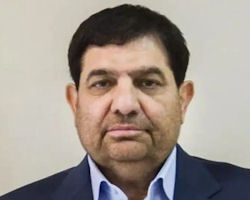 Mohammad Mokhber is an influential Iranian politician and bureaucrat, having served as the First Vice President of Iran under President Ebrahim Raisi since August 2021. Born on May 8, 1955, in Dezful, Iran, Mokhber has a strong background in both administrative roles and in the management of large state-owned enterprises. Appointed by President Ebrahim Raisi, Mokhber's role as First Vice President made him a key figure in the administration, responsible for coordinating government policies and overseeing executive affairs. His appointment reflects his trusted status within Iran's political elite and his alignment with the country's conservative leadership.
Mohammad Mokhber is an influential Iranian politician and bureaucrat, having served as the First Vice President of Iran under President Ebrahim Raisi since August 2021. Born on May 8, 1955, in Dezful, Iran, Mokhber has a strong background in both administrative roles and in the management of large state-owned enterprises. Appointed by President Ebrahim Raisi, Mokhber's role as First Vice President made him a key figure in the administration, responsible for coordinating government policies and overseeing executive affairs. His appointment reflects his trusted status within Iran's political elite and his alignment with the country's conservative leadership.
Mokhber holds a degree in business administration, which has underpinned his career in economic management and policy-making. His academic background complements his practical experience in managing large-scale economic initiatives. Mohammad Mokhber's career reflects his significant role in shaping Iran's economic policies and his alignment with the country's conservative and hardline leadership. His expertise in economic management and his strategic roles within the government underscore his influence in Iran's ongoing efforts to navigate economic challenges and maintain stability.
Before becoming First Vice President, Mokhber was the Head of the Execution of Imam Khomeini's Order (EIKO), a significant conglomerate known for managing a vast array of economic assets. This organization, directly controlled by the Supreme Leader, plays a crucial role in Iran's economy, with activities spanning various sectors, including real estate, healthcare, and manufacturing. Mokhber is widely recognized for his expertise in economic management. During his tenure at EIKO, he was responsible for overseeing major economic projects and initiatives that aimed to support the underprivileged and promote economic self-sufficiency within the framework of Iran's resistance economy.
Mokhber's policy focus includes economic reform, enhancing domestic production, and reducing reliance on foreign imports. His work at EIKO and his role in the government emphasize boosting Iran's economic resilience in the face of international sanctions and economic pressures.
Mokhber is perceived as a competent and effective administrator, particularly within conservative circles. His leadership at EIKO and his efforts in the government have garnered respect among those who support Iran's economic independence and self-reliance strategies. However, like many Iranian officials, he also faces criticism from reformists and moderates who advocate for more significant economic and political reforms.
3% - Gholam-Hossein Esmaeili
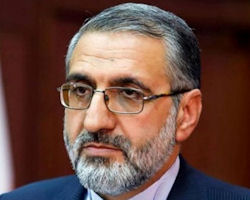 Gholam-Hossein Esmaeili / Esmaili is a prominent Iranian jurist and political figure. On August 8, 2021, he was appointed as chief of staff of of Iranís President Ebrahim Raisi after Seyyed Ibrahim Raeesi started working as the president. He is one of the wounded veterans of the Holy Defence era. He has held various significant positions within Iran's judicial system and government. Esmaeili has served in various capacities within the Iranian judiciary. He has been a judge and has held several high-ranking judicial positions.
Gholam-Hossein Esmaeili / Esmaili is a prominent Iranian jurist and political figure. On August 8, 2021, he was appointed as chief of staff of of Iranís President Ebrahim Raisi after Seyyed Ibrahim Raeesi started working as the president. He is one of the wounded veterans of the Holy Defence era. He has held various significant positions within Iran's judicial system and government. Esmaeili has served in various capacities within the Iranian judiciary. He has been a judge and has held several high-ranking judicial positions.
Born in 1965 in Birjand, Iran, he received his doctorate degree in private law from Tarbiat Modares University.During his student days, Esmaili was nominated twice by the Ministry of Science, Research and Technology as the first rank and model student of the country in bachelor's, master's and doctoral degrees. He started his studies in seminary sciences in 1373, and in 1379 he was introduced as a selected researcher of the country. Gholamhossein Esmaili has the experience of being the head of the faculty of law of Imam Sadiq University (AS) and membership as a legal member of the Guardian Council in his record.
He was the head of Iran's prisons organization from 2008 to May 2013, when he was replaced by Ali Asghar Jahangir, the former head of information protection of the judiciary. As Head of the Prisons Organization of Iran, he was responsible for overseeing the administration of prisons and detention centers across the country. In this capacity, he was complicit to the massive detention of political protesters and covering up abuses performed in the jailing system. On 03 March 2011, reformist news outlet Radio Zamaneh reported that prisons head Esmaili told a gathering of prosecutors that the total prison population was 220,000 inmates, which included 70,000 prisoners awaiting sentencing. The official capacity of the prison system is approximately 85,000. Esmaili also reportedly stated that the number of prisoners in the country had risen by 55,000 since he became head of prisons 18 months earlier. In July 2012 the media reported that Prisons Organization head Gholamhossein Esmaili claimed that some prisons held as many as six times the number of inmates they were designed to hold. The prison population appeared to have stabilized during the year.
According to the decision dated April 13, 2011, the European Union banned 32 Iranian officials, including Gholamhossein Esmaili, from entering the countries of the European Union due to their role in the widespread and severe violation of the rights of Iranian citizens. The European Union also decided to freeze all the assets of these officials in Europe.
Esmaili was also the chief justice of Tehran province and the head of the first branch of the court of appeals, and since August 7, 2018, he has been introduced as the head of the judicial branch in the meeting of the Supreme Judicial Council. The head of the judicial system also appreciated the efforts of Seyed Morteza Bakhtiari during his tenure as the head of the Judiciary and wished him success in the position of head of the Imam Khomeini (RA) Relief Committee.
One of Esmaeili's prominent roles has been as the spokesperson for Iran's judiciary. He was introduced as the spokesperson of the Judiciary since April 19, 2018 by Seyed Ibrahim Raisi, the head of the Judiciary at the time. In this position, he has been the public face of the judiciary, providing official statements, addressing media queries, and communicating the judiciary's stance on various legal and political issues. Esmaeili has been involved in advocating for and implementing legal reforms within the Iranian judicial system. His work often focuses on improving the efficiency, transparency, and fairness of the judicial process. As the judiciary's spokesperson, Esmaeili has been instrumental in shaping the public's understanding of legal proceedings, high-profile cases, and judicial reforms. His role involves not only addressing legal matters but also managing the judiciary's public image.
While primarily known for his judicial roles, Esmaeili has also been involved in broader political matters. His statements and positions on various issues reflect the judiciary's perspective and often align with the broader political and ideological stance of the Iranian government. Esmaeili's tenure in various judicial roles, especially as the head of the Prisons Organization, has been marked by controversy. Human rights organizations have criticized Iran's prison conditions and judicial practices, and Esmaeili has been a focal point of these criticisms due to his leadership roles. Esmaeili remains a significant figure in Iran's judicial and political landscape, known for his influential roles and the controversies surrounding his tenure in various capacities.
Gholamhossein Esmaili, the head of Ebrahim Raeesi's office, who was one of the members of the delegation who accompanied him on the last trip but was present in another helicopter, on May 21 (1st of Khordad), in a television program, gave new details and an official account of the failed flight of the President of the Islamic Republic of Iran. Gholamhossein Esmaili, repeatedly emphasizing that the weather was very good on the day and time of the incident.
2% - Mohsen Rezaee
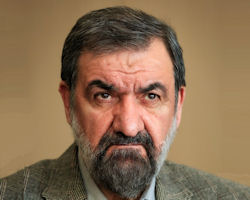 Mohsen Rezaei / Rezaee is a conservative Iranian politician, affiliated with the Resistance Front of Islamic Iran. Mohsen Rezaei is a prominent Iranian politician, economist, and military figure. Born on September 9, 1954, in Masjed Soleyman, Khuzestan Province, Iran, he has played a significant role in the country's political and military landscape. He is presently the Secretary of the High Council for Economic Coordination of the Heads of Powers.
Mohsen Rezaei / Rezaee is a conservative Iranian politician, affiliated with the Resistance Front of Islamic Iran. Mohsen Rezaei is a prominent Iranian politician, economist, and military figure. Born on September 9, 1954, in Masjed Soleyman, Khuzestan Province, Iran, he has played a significant role in the country's political and military landscape. He is presently the Secretary of the High Council for Economic Coordination of the Heads of Powers.
He served as the Vice President of Iran for Economic Affairs between 2021 and 2023. From 1997 to 2021 he was Secretary of the Islamic Republicís constitutional Expediency Council, which resolves issues between the Parliament and the Guardian Council. From 1980 to 1997, Rezaee was commander-in-chief of the Islamic Revolutionary Guard Corps. Rezaee is known as one of the first members of the Islamic Revolutionary Guard since the early days of the Islamic Republic. Before the Iranian Revolution, Rezaee was a member of the Islamist guerilla rebel group Mansouroun and joined the Mojahedin of the Islamic Revolution Organization following the revolution.
Rezaei served as the Commander-in-Chief of the Islamic Revolutionary Guard Corps (IRGC) from 1981 to 1997. During his tenure, he played a crucial role in the Iran-Iraq War, helping to organize and lead military operations. With the planning of Mohsen Rezaei, the command structure of the IRGC was gradually moved out of the center and settled on the war fronts, and as one of the elements of planning operations to drive out the Iraqi Baath army, he realized the necessity of military organization of the IRGC structure to carry out various operations. On the other hand, Basiji volunteer forces came to the war fronts in large numbers to carry out operations, and this problem highlighted the need to organize volunteer forces in a new structure. The IRGC found a military organization and changing the administrative structure of the IRGC towards a military organization became a necessity for the defense of the country.
Before the Saman al-Aima operation, some IRGC officials had come to the conclusion that there should be combat battalions in the IRGC. The plan of these combat battalions was prepared and it was put on the agenda as a program, but practically, after the Al-Quds operation, the commanders of the IRGC came to the conclusion that in order to plan and execute major operations, extensive military organization should be done on the war fronts. Therefore, before the Fatah al-Mobin operation, Sardar Mohsen Rezaei implemented the plan to form combat brigades consisting of Basij guards and volunteer forces, and these brigades were actually formed after the Al-Quds operation.
After his military career, Rezaei transitioned to politics. He has been a member of the Expediency Discernment Council, which advises the Supreme Leader and resolves legislative issues between the Iranian Parliament and the Guardian Council. With a background in economics, Rezaei has been involved in economic planning and policy-making in Iran. He has advocated for various economic reforms and strategies to improve Iran's economy. Rezaei has also engaged in academic and intellectual activities, including writing on political, economic, and strategic issues. His work often reflects his experience in both military and economic spheres.
Rezaei has run for the presidency of Iran multiple times, including in 2005, 2009, 2013, and 2021. Although he has not won any of these elections, his candidacies have kept him a notable figure in Iranian politics. Rezaeiís seemingly perpetual, unsuccessful presidential bids have turned him into the subject of jokes among many Iranians. First running in 2005, when he withdrew, he lost in 2009 with only 1.7% of the vote. In his bid in 2013, he finished fourth behind Saeed Jalili at 10%, and improved his standing in 2021 with 11.8% of hte vote. On October 26, 2019, BBC in a report titled "New Narratives of the Removal of Opponents of the IRGC Command during the War", Mohsen Rezaei, the Commander-in-Chief of the IRGC during the Sacred Defense and the current Secretary of the Expediency Discernment Council, was the focus of media attacks.
Like many political figures, Rezaei has been involved in controversies. His leadership of the IRGC during the Iran-Iraq War and his political statements have sometimes attracted criticism both domestically and internationally.He is known for his suggestion a few years ago to take American servicemen, who are in the Middle East hostage and then demand a one-billion-dollar ransom for each. Muslim governments should form an Islamic army to to counteract excesses of the United States and Israel in the region, Mohsen Rezaee, ex-IRGC commander said on 31 October 2023.
He told Al Jazeera in an interview that Israel finds itself ďin a quagmireĒ and the current war ďcould become a long and global conflict.Ē Although Iranian officials have been strongly supporting Hamas since the October 7 terror attack on Israel, so far they have hesitated in widening the conflict. The senior regime insider also repeated some of the claims made by other officials, including an assertion that the United States is running Israelís war in Gaza. He added, ďThe Zionist regime lacks the knowledge of popular struggles and has entered a vast quagmire, possibly taking action to expand the war in the region to conceal it.Ē
In a meeting with a number of representatives of the newly elected 12th parliament, he stated that the future parliament needs unity inside and synergy with other powers outside, adding: unity inside is possible through collective work and avoiding isolation. Compassionate and fair criticism helps to unite the forces, but revenge and destruction harms the brothers and destroys the collective unity. The member of the Expediency Recognition Council added: The era of individualism and person-centeredness in the administration of the country's institutions and organizations is over. The factions of the Islamic Council are able to compensate for the parties' gap in sectoral cohesion and collective decision-making.
His eldest son, Ahmad, migrated to the United States in 1998 and sought political asylum. Ahmad spoke against the policies of the Iranian Islamic government, and accused his father and others of supporting terrorist acts. Ahmad returned to Iran in 2005, recanting his anti-regime statements, and migrated to the United Arab Emirates in 2011. On 13 November 2011, his body was found in a hotel in Dubai. It was first reported that he was killed by a hotel servant, but the Dubai Police late stated that he had died after taking a large quantity of antidepressants.
Rezaei remains an influential figure in Iran, known for his strategic insights and his involvement in shaping the country's policies over several decades. Mohsen Rezaei has remained in the orbit of insiders around Supreme Leader Ali Khamenei, but he is not considered a particularly close confidant or key decision-maker.
Not Ranked by Manifold
Mehrdad Bazrpash
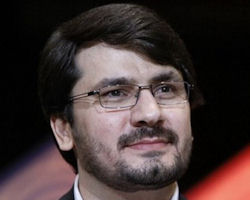 Mehrdad Bazrpash is a prominent Iranian politician and public figure known for his involvement in various governmental and legislative roles. Born on August 15, 1980, in Tehran, Iran, Bazrpash was a former Basij militia leader, lawmaker and vice president in the government of Mahmoud Ahmadinejad. Bazrpash had a dynamic career, marked by his work as a legislator, his contributions to the media sector, and his positions in executive administration. Mehrdad Bazrpash served as the Minister of Roads and Urban Development in President Ebrahim Raisi's administration. This role places him at the forefront of Iran's infrastructure and urban planning policies, critical areas for the country's development and economic growth.
Mehrdad Bazrpash is a prominent Iranian politician and public figure known for his involvement in various governmental and legislative roles. Born on August 15, 1980, in Tehran, Iran, Bazrpash was a former Basij militia leader, lawmaker and vice president in the government of Mahmoud Ahmadinejad. Bazrpash had a dynamic career, marked by his work as a legislator, his contributions to the media sector, and his positions in executive administration. Mehrdad Bazrpash served as the Minister of Roads and Urban Development in President Ebrahim Raisi's administration. This role places him at the forefront of Iran's infrastructure and urban planning policies, critical areas for the country's development and economic growth.
Bazrpash was elected to the Iranian Parliament (Majlis) representing Tehran, Rey, Shemiranat, and Eslamshahr. During his tenure, he was known for his active participation in legislative processes and his advocacy for policies aligned with conservative values. Before becoming a minister, Bazrpash was the head of the Supreme Audit Court of Iran, a position that involved overseeing the financial and administrative performance of various government entities. Mehrdad Bazrpash who is was elected with 158 of the total 244 votes cast. His work in this role was aimed at promoting transparency and accountability within the government. Bazrpash also served as the CEO of SAIPA, one of Iran's largest automobile manufacturers. His tenure at SAIPA highlighted his involvement in Iran's industrial sector and his efforts to enhance the company's performance amid economic challenges.
Earlier in his career, Bazrpash was involved in the media sector, notably as the managing director of the conservative newspaper Vatan-e-Emrooz. His work in media helped establish his public profile and his reputation as a staunch conservative voice. Bazrpash holds a degree in industrial engineering from Sharif University of Technology, one of Iran's premier technical universities. His technical and managerial education has been a foundation for his various roles in both the public and private sectors.
Bazrpash is aligned with Iran's conservative political factions. Bazrpash somehow distanced himself from Ahmadinejad after his second term of presidency came to an end in 2013. He is very close to the ultra-hardliner Paydari Front. His career has been marked by his advocacy for policies that emphasize economic independence, national sovereignty, and the promotion of Islamic values within the framework of the Islamic Republic. As one of the younger figures in Iranian politics, Bazrpash has often been seen as a representative of the new generation of conservative leaders. He has been involved in initiatives aimed at leveraging technology and innovation to address Iran's economic and social challenges.
Bazrpash is a well-known figure within Iran, particularly among conservatives. His various roles have showcased his administrative capabilities and his commitment to conservative principles. He is recognized for his ability to navigate complex bureaucratic and industrial landscapes, making him a significant player in Iran's political and economic spheres. Mehrdad Bazrpash's multifaceted career, encompassing roles in government, industry, and media, reflects his influence and prominence in contemporary Iranian politics. His work continues to shape key aspects of Iran's infrastructure development and economic policies, solidifying his position as an important conservative leader.
Ali Larijani
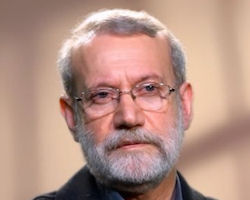 Ali Larijani is a prominent Iranian politician, diplomat, and academic, known for his influential roles in Iran's political landscape. Larijani has been a candidate in Iranian presidential elections, most notably running in the 2005 election. Although he did not win, his participation highlighted his prominence within the conservative political faction and his potential for leadership at the highest levels. Some analysts say Khamenei has not forgiven him for forging close ties with former President Hassan Rouhani in what hardliners perceived as a conspiracy to influence the process of Khameneiís succession.
Ali Larijani is a prominent Iranian politician, diplomat, and academic, known for his influential roles in Iran's political landscape. Larijani has been a candidate in Iranian presidential elections, most notably running in the 2005 election. Although he did not win, his participation highlighted his prominence within the conservative political faction and his potential for leadership at the highest levels. Some analysts say Khamenei has not forgiven him for forging close ties with former President Hassan Rouhani in what hardliners perceived as a conspiracy to influence the process of Khameneiís succession.
Born on June 3, 1957, in Najaf, Iraq, Larijani comes from a distinguished family with significant political and religious influence in Iran. Ali Larijani is one of the influential Larijani brothers, who hold significant positions in Iran's political and judicial systems. His brothers include Sadegh Larijani, the former head of the judiciary, and Mohammad Javad Larijani, a prominent diplomat and intellectual. The Larijani family is well-connected within the political elite and has considerable sway in various aspects of governance and policy.
Larijani holds a Ph.D. in Western Philosophy from the University of Tehran and has taught philosophy at various academic institutions. His intellectual background has informed his political and diplomatic strategies, providing a foundation for his analytical approach to governance and policy-making. He served as the head of the Islamic Republic of Iran Broadcasting (IRIB) from 1994 to 2004, where he oversaw the state-run media organization. His tenure at IRIB was marked by efforts to shape public opinion and disseminate state policies through media.
Larijani served as the Speaker of the Islamic Consultative Assembly (Iranian Parliament) from 2008 to 2020. His tenure as Speaker was marked by his efforts to navigate the legislative body through a period of significant domestic and international challenges, including economic sanctions and political unrest. Before his tenure as Speaker, Larijani served as the Secretary of the Supreme National Security Council from 2005 to 2007. In this role, he was Iran's top security official and chief nuclear negotiator, engaging in critical discussions with international powers regarding Iran's nuclear program. After stepping down as Speaker, Larijani was appointed as an advisor to Supreme Leader Ayatollah Ali Khamenei, reflecting his ongoing influence in Iran's strategic decision-making processes.
While Larijani is a conservative, he is often seen as a pragmatic politician who can work across different factions. His ability to navigate complex political landscapes and his willingness to engage in negotiations with international powers reflect a nuanced approach to conservatism. As a former chief nuclear negotiator, Larijani has been an advocate for dialogue and diplomacy in addressing Iran's international issues. His tenure in various high-stakes roles underscores his commitment to finding balanced solutions to Iran's challenges.
Larijani is respected within conservative circles for his steadfastness and intellectual contributions. However, he has also faced criticism from reformists and moderates who view him as part of the entrenched political elite resistant to significant reforms. His influence remains significant, particularly in strategic and advisory capacities. Ali Larijani's multifaceted career, encompassing roles in government, academia, and media, highlights his enduring influence in Iranian politics. His blend of conservatism, pragmatism, and intellectual rigor has made him a key player in shaping Iran's policies and navigating its complex political landscape.
Once key insiders, the Larijani brothers have been cast into the outer darkness. Khamenei appointed hardline cleric Ebrahim Raisi as chief justice before the official term of Amoli came to an end. Amoli's enemies weren't finished, and seemingly planned to eject him and his whole family out of power. "I am the treasury of the secrets about [the charges] of [officials] and sons of officials and figures, and today I am still paying the price of standing up to them," said Amoli in his open letter to Yazdi on 18 August 2019. The 2021 presidential elections paved the path for the abrupt end to the political careers of two influential brothers, Ali Larijani, a former parliament speaker, and Amoli Larijani, a former member of the Guardian Council. Ali Larijani ran for president, but he was unexpectedly banned from the election race by the Guardian Council, whose members are appointed by the leader. The deep state feared that Ali Larijani's possible victory in the presidential elections would embolden the Larijanis and once again increase the chance of Amoli Larijani as a successor of Khamenei.
Javad Zarif
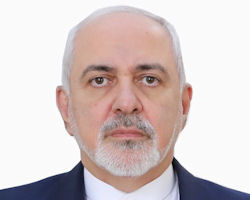 Javad Zarif is a prominent Iranian diplomat and academic, best known for his role as Iran's Foreign Minister from 2013 to 2021. Principlists see Zarif as their biggest threat, but many believe he wouldn't get approval from the Guardian Council, as the establishment doesnít trust him enough to allow him to run. Zarif has had a significant impact on Iran's foreign policy, particularly in relation to the country's nuclear program and its international relations. Zarif is often seen as a pragmatist and a moderate within Iran's political spectrum. He advocates for engaging with the international community and using diplomacy to resolve conflicts. His approach contrasts with the more hardline elements within the Iranian government, who favor a more confrontational stance. Throughout his career, Zarif has had to navigate the complex political landscape of Iran, balancing the demands of the conservative factions with the need for international diplomacy. His ability to maintain this balance has been both a strength and a challenge.
Javad Zarif is a prominent Iranian diplomat and academic, best known for his role as Iran's Foreign Minister from 2013 to 2021. Principlists see Zarif as their biggest threat, but many believe he wouldn't get approval from the Guardian Council, as the establishment doesnít trust him enough to allow him to run. Zarif has had a significant impact on Iran's foreign policy, particularly in relation to the country's nuclear program and its international relations. Zarif is often seen as a pragmatist and a moderate within Iran's political spectrum. He advocates for engaging with the international community and using diplomacy to resolve conflicts. His approach contrasts with the more hardline elements within the Iranian government, who favor a more confrontational stance. Throughout his career, Zarif has had to navigate the complex political landscape of Iran, balancing the demands of the conservative factions with the need for international diplomacy. His ability to maintain this balance has been both a strength and a challenge.
Born on January 8, 1960, in Tehran, Iran, Zarif holds a Bachelor's degree in International Relations from San Francisco State University and a Master's degree and Ph.D. in International Law and Policy from the University of Denver. His education in the U.S. provided him with a deep understanding of Western political and diplomatic practices, which he later applied in his diplomatic career. Zarif has been involved in academia, teaching international relations and diplomacy at various institutions. He has also written extensively on foreign policy issues, contributing to both scholarly and public discourse on international relations.
Zarif served as Iran's Permanent Representative to the United Nations from 2002 to 2007. During his tenure, he was known for his articulate defense of Iran's policies and his efforts to engage with the international community. As Foreign Minister under President Hassan Rouhani from 2013 to 2021, Zarif played a crucial role in shaping Iran's foreign policy. He was instrumental in negotiating the Joint Comprehensive Plan of Action (JCPOA), commonly known as the Iran nuclear deal, which was signed in 2015. The agreement aimed to limit Iran's nuclear program in exchange for the lifting of economic sanctions.
Zarif is widely recognized as the chief architect of the JCPOA. His diplomatic skills were pivotal in reaching the agreement with the P5+1 group (the five permanent members of the UN Security Council plus Germany). The deal marked a significant moment in Iran's international relations, though it faced criticism both domestically and internationally, especially after the U.S. withdrawal from the agreement in 2018 under President Donald Trump.
Zarif faced criticism from hardliners within Iran who view his diplomatic efforts, particularly the JCPOA, as compromising Iran's sovereignty and security. He has also been criticized by reformists who feel that his efforts have not brought sufficient economic relief due to the continued impact of sanctions. The unilateral withdrawal of the United States from the JCPOA in 2018 posed significant challenges to Zarif's diplomatic achievements. Despite efforts to keep the deal alive with the remaining signatories, the re-imposition of U.S. sanctions has severely impacted Iran's economy and its international relations.
Zarif's legacy is closely tied to his efforts to reintegrate Iran into the international community and to mitigate the economic impacts of sanctions through diplomatic means. His work on the JCPOA remains a significant, albeit contentious, achievement in contemporary Iranian history. Javad Zarif's career reflects his dedication to diplomacy and his ability to navigate the intricacies of international relations. Despite facing considerable challenges and criticisms, both domestically and internationally, his efforts have left a lasting impact on Iran's foreign policy landscape.
Ali Akbar Salehi
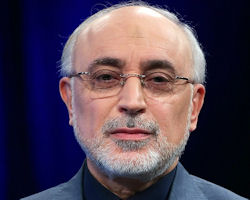 Ali Akbar Salehi is a prominent Iranian scientist, academic, and diplomat, known for his significant contributions to Iran's nuclear program and his various roles in the Iranian government. Salehi has had a distinguished career in both scientific and political spheres.
Ali Akbar Salehi is a prominent Iranian scientist, academic, and diplomat, known for his significant contributions to Iran's nuclear program and his various roles in the Iranian government. Salehi has had a distinguished career in both scientific and political spheres.
Born on April 24, 1949, in Karbala, Iraq, Salehi holds a Bachelorís degree in Physics from the American University of Beirut and a Ph.D. in Nuclear Engineering from the Massachusetts Institute of Technology (MIT). His education provided him with a strong foundation in nuclear science and engineering. Salehi has held various academic positions, including serving as a faculty member at Sharif University of Technology in Tehran. His academic work has been influential in shaping Iranís nuclear science education and research. Salehiís contributions to nuclear science and technology have been significant, particularly in the context of Iranís nuclear program. He has authored numerous scientific papers and has been involved in advancing Iranís nuclear capabilities.
Salehi served as the head of the Head of the Atomic Energy Organization of Iran (AEOI) in two terms, first from 2009 to 2010 and again from 2013 to 2021. In this role, he was responsible for overseeing Iranís nuclear program, including the development of nuclear technology for peaceful purposes.From 2010 to 2013, Salehi served as Iranís Foreign Minister. During his tenure, he played a key role in international negotiations and diplomatic efforts to address Iranís nuclear program and broader foreign policy issues.
Salehi was a key figure in the negotiations leading to the Joint Comprehensive Plan of Action (JCPOA) in 2015. His technical expertise and diplomatic skills were instrumental in reaching the agreement, which aimed to limit Iranís nuclear activities in exchange for the lifting of economic sanctions. Throughout the JCPOA negotiations and beyond, Salehi engaged with international counterparts to advocate for Iranís right to peaceful nuclear technology while addressing international concerns about nuclear proliferation.
Salehi is often seen as a pragmatic and moderate figure within Iranís political landscape. He has advocated for the peaceful use of nuclear technology and has supported diplomatic solutions to international disputes. Salehi has consistently emphasized the importance of scientific and technological development for Iranís progress. His work has focused on harnessing nuclear technology for energy, medical, and industrial applications.
Salehi is respected both domestically and internationally for his expertise and his role in advancing Iranís nuclear program within the framework of international agreements. He is seen as a knowledgeable and capable leader in the scientific community and a skilled diplomat. Like many Iranian officials involved in the nuclear program, Salehi has faced criticism from various quarters. Hardliners within Iran have sometimes viewed his engagement with international bodies as too conciliatory, while some international actors remain skeptical of Iranís nuclear intentions despite the JCPOA.
Salehiís legacy is closely tied to his dual roles as a scientist and diplomat. His efforts to develop Iranís nuclear technology and to negotiate international agreements have had a lasting impact on the countryís scientific and diplomatic standing. Salehi has been a vocal advocate for the peaceful use of nuclear energy, emphasizing its potential benefits for Iranís development. His work has contributed to the broader discourse on nuclear energy and non-proliferation. Ali Akbar Salehi's career reflects a blend of scientific excellence and diplomatic acumen. His contributions to Iranís nuclear program and his role in international negotiations have made him a key figure in both Iranís scientific community and its political landscape.
Abdolnaser Hemmati
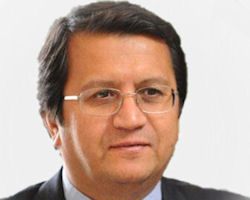 Abdolnaser Hemmati is a prominent Iranian economist, academic, and politician, known for his significant roles in Iran's financial and economic sectors. Hemmati has held various influential positions, including the governorship of the Central Bank of Iran. Hemmati ran as a candidate in the 2021 Iranian presidential election. He positioned himself as a moderate and pragmatic candidate, focusing on economic reform and improving Iran's international relations to alleviate economic sanctions. Although he did not win, his candidacy highlighted his prominence in Iran's economic and political spheres.
Abdolnaser Hemmati is a prominent Iranian economist, academic, and politician, known for his significant roles in Iran's financial and economic sectors. Hemmati has held various influential positions, including the governorship of the Central Bank of Iran. Hemmati ran as a candidate in the 2021 Iranian presidential election. He positioned himself as a moderate and pragmatic candidate, focusing on economic reform and improving Iran's international relations to alleviate economic sanctions. Although he did not win, his candidacy highlighted his prominence in Iran's economic and political spheres.
Born on April 9, 1957, in Kabudarahang, Iran, Hemmati holds a Ph.D. in Economics from the University of Tehran. His academic background has provided him with a strong foundation in economic theory and policy, which has informed his various professional roles. Hemmati has served as a professor of economics at the University of Tehran and other academic institutions. His academic work includes research and publications on monetary policy, banking, and economic development, contributing to the field of economics in Iran.
Hemmati held various positions in Iran's insurance sector, including serving as the President of the Central Insurance of Iran and the CEO of Bank Melli, one of the country's largest banks. His work in the insurance industry focused on modernizing and expanding insurance services in Iran.
Hemmati was appointed as the Governor of the Central Bank of Iran (CBI) in July 2018. During his tenure, he faced the challenging task of managing Iran's economy under severe U.S. sanctions, high inflation, and economic instability. His policies aimed at stabilizing the currency and controlling inflation, although he faced significant challenges due to external economic pressures. One of Hemmati's primary goals as Central Bank Governor was to stabilize the Iranian rial, which had experienced significant devaluation. He implemented measures to regulate the currency market and control inflation, including adjusting interest rates and managing foreign exchange reserves. Hemmati advocated for various monetary reforms to improve Iran's economic resilience and to address structural issues within the banking sector. His efforts included promoting digital banking and financial transparency.
Hemmati's tenure at the Central Bank coincided with the re-imposition of U.S. sanctions following the U.S. withdrawal from the JCPOA in 2018. These sanctions severely impacted Iran's economy, complicating Hemmati's efforts to implement effective monetary policies. Despite his efforts, Iran continued to face high inflation and economic instability. Critics argued that the measures taken were insufficient to address the deep-rooted economic issues exacerbated by sanctions and internal mismanagement.
Hemmati is recognized for his expertise in economics and his attempts to navigate Iran through a period of significant economic turmoil. His work has been influential in shaping Iran's monetary policy and banking reforms. Beyond his administrative roles, Hemmati's academic contributions to the field of economics have also been significant, influencing both policy makers and students in Iran. Abdolnaser Hemmati's career reflects his dedication to addressing Iran's economic challenges through both academic insights and practical policy measures. Despite facing substantial obstacles, his efforts in economic management and his role in the presidential election underscore his influence and commitment to improving Iran's economic stability.
Ali Shamkhani
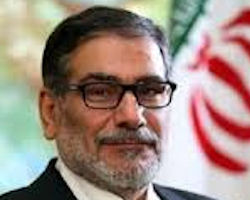 Ali Shamkhani is a prominent Iranian military officer and politician, best known for his long-standing role in Iran's national security apparatus. Shamkhani has had a distinguished career, serving in various high-profile military and governmental positions. Shamkhani is often seen as a pragmatic strategist. He has advocated for a balanced approach to national security that includes both military strength and diplomatic engagement. His stance reflects a blend of hardline principles with pragmatic adaptability to changing geopolitical realities. Despite his military background, Shamkhani has shown a willingness to work with reformist and moderate factions within Iranís political spectrum. His appointment as Defense Minister under the reformist President Khatami and his continued influence under more conservative administrations highlight his ability to navigate different political currents.
Ali Shamkhani is a prominent Iranian military officer and politician, best known for his long-standing role in Iran's national security apparatus. Shamkhani has had a distinguished career, serving in various high-profile military and governmental positions. Shamkhani is often seen as a pragmatic strategist. He has advocated for a balanced approach to national security that includes both military strength and diplomatic engagement. His stance reflects a blend of hardline principles with pragmatic adaptability to changing geopolitical realities. Despite his military background, Shamkhani has shown a willingness to work with reformist and moderate factions within Iranís political spectrum. His appointment as Defense Minister under the reformist President Khatami and his continued influence under more conservative administrations highlight his ability to navigate different political currents.
Born on September 29, 1955, in Ahvaz, Iran, Shamkhani's military career began with significant involvement in the Iran-Iraq War (1980-1988). He served in various capacities, including as a commander in the Islamic Revolutionary Guard Corps (IRGC) and the Iranian Army. His contributions during the war earned him a reputation as a competent and strategic military leader. After the war, Shamkhani was appointed as the Commander of the IRGC Navy. He played a crucial role in modernizing Iranís naval capabilities and enhancing its strategic maritime operations in the Persian Gulf.
Shamkhani served as Iran's Minister of Defense from 1997 to 2005 under President Mohammad Khatami. During his tenure, he focused on modernizing Iranís military infrastructure, expanding its defense industries, and strengthening its defense capabilities. : Since September 2013, Shamkhani has been serving as the Secretary of the Supreme National Security Council (SNSC), one of the most influential positions in Iranís national security and foreign policy establishment. In this role, he was responsible for coordinating the countryís security policies, advising the Supreme Leader, and overseeing critical security and foreign policy issues.
Shamkhani has been actively involved in regional diplomacy, particularly concerning Iran's relationships with neighboring countries. He has played a significant role in mediating conflicts and enhancing Iran's strategic alliances in the Middle East. Although not directly involved in the day-to-day negotiations, Shamkhani was a key figure in shaping Iranís strategic approach to the Joint Comprehensive Plan of Action (JCPOA) and other international agreements concerning Iran's nuclear program.
As Secretary of the SNSC, Shamkhani has faced significant challenges, including managing internal political factions and responding to external pressures from international sanctions and regional conflicts. His leadership has been critical in addressing these multifaceted issues. : One of Shamkhani's ongoing challenges is balancing Iranís security needs with its diplomatic efforts. His ability to maintain this balance has been crucial in ensuring the country's stability and strategic interests.
Shamkhani is widely respected within Iranís political and military establishments for his experience, strategic acumen, and pragmatic approach. His contributions to national security and defense have solidified his reputation as a key figure in Iran's power structure. He is also a visible public figure, often representing Iran's security positions in media and international forums. His articulate and measured public statements have contributed to his reputation as a capable and strategic leader. Ali Shamkhani's career reflects his significant impact on Iranís military and national security policies. His roles in both military leadership and high-level political positions have made him a central figure in shaping Iranís strategic direction in a complex and often volatile regional context.
|
NEWSLETTER
|
| Join the GlobalSecurity.org mailing list |
|
|
|

